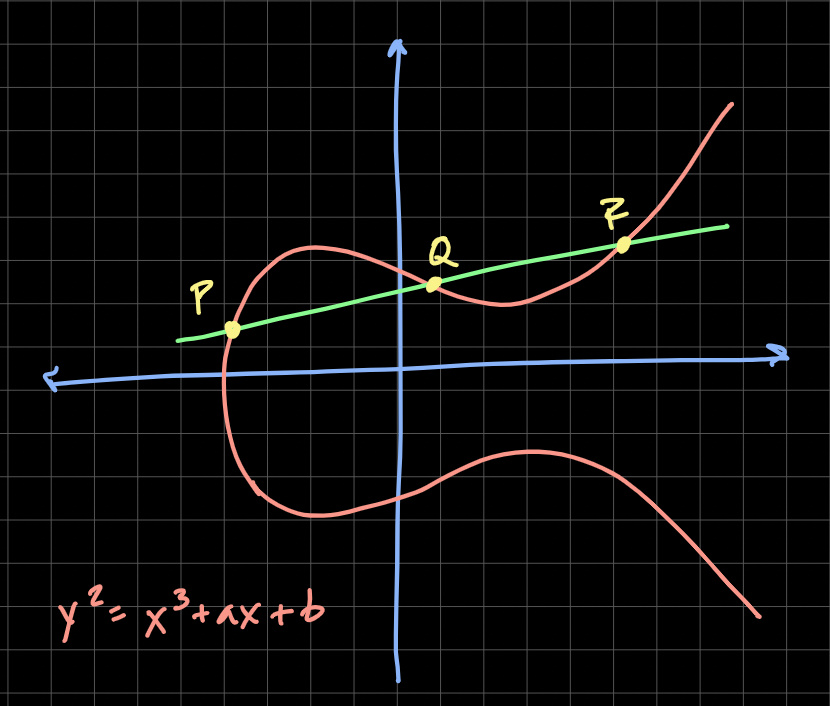
What Is Elliptic Curve Cryptography & How Does It Work
- QCecuring Team
- 13 Oct, 2025
- 03 Mins read
- Security , Encryption
Elliptic Curve Cryptography (ECC) is a modern public-key cryptography method that has gained traction due to its efficiency, compact key sizes, and strong security guarantees. Unlike traditional systems such as RSA or Diffie-Hellman, ECC provides equivalent or better security with smaller keys, resulting in faster encryption, decryption, and lower computational overhead.
🔐 What Is Elliptic Curve Cryptography?
Elliptic Curve Cryptography (ECC) is a type of asymmetric cryptography that relies on the mathematical properties of elliptic curves. In asymmetric cryptography:
- Public Key: Used to encrypt data or verify signatures.
- Private Key: Used to decrypt data or create digital signatures.
ECC uses points on an elliptic curve described by the equation:
[ y^2 = x^3 + ax + b ]
Where a and b are constants defining the curve. A special point, called the point at infinity, acts as the identity element for curve operations.
Compared to RSA, ECC achieves similar or better security with significantly smaller key sizes, which reduces bandwidth and improves performance — critical for modern applications like IoT, mobile devices, and TLS connections.
🧩 How Does ECC Work?
Each ECC user has:
- Private Key: A randomly chosen integer.
- Public Key: A point on the curve, generated by multiplying the private key with a generator point on the curve.
Encryption & Decryption Process
- The sender uses the recipient’s public key and their own private key to compute a shared secret.
- This shared secret encrypts the message.
- The recipient uses their private key and the sender’s public key to derive the same shared secret for decryption.
This method is secure due to the Elliptic Curve Discrete Logarithm Problem (ECDLP) — finding a private key from a public key is computationally infeasible.
⚡ Advantages of ECC
ECC has several advantages over traditional systems like RSA and Diffie-Hellman:
- Smaller Key Sizes: ECC keys are shorter, reducing bandwidth, storage, and processing requirements.
- Example: ECC-256 ≈ RSA-3072 in security strength.
- Higher Efficiency: Faster key generation, encryption, and decryption.
- Quantum Resistance (Relative): ECC is more resilient against some quantum attacks compared to RSA (though fully quantum-safe algorithms are still in research).
- Stronger Security Per Bit: ECC delivers higher security with fewer resources, making it ideal for mobile, IoT, and constrained environments.
🌐 Real-World Applications of ECC
ECC is widely adopted in security-critical applications:
- TLS / HTTPS: Many modern websites use ECC-based certificates.
- Cryptocurrencies: Bitcoin, Ethereum, and other blockchain platforms use ECC for digital signatures.
- Mobile Security: ECC is common in smartphones for secure messaging apps and authentication.
- IoT Devices: Small key sizes are perfect for low-power devices requiring strong encryption.
⚖️ ECC vs Traditional Public-Key Systems
| Feature | RSA / Diffie-Hellman | ECC |
|---|---|---|
| Key Size for 128-bit Security | 3072 bits | 256 bits |
| Encryption / Decryption Speed | Slower | Faster |
| Memory / Bandwidth Use | Higher | Lower |
| Quantum Resilience | Lower | Higher (relative) |
| Ideal Use Cases | General-purpose, legacy | Modern web, mobile, IoT, blockchain |
🛡️ Security Considerations
While ECC is highly secure, some points to keep in mind:
- Curve Selection: Use standardized curves (e.g., NIST P-256, Curve25519). Weak curves can compromise security.
- Implementation Risks: Side-channel attacks and faulty implementations can break ECC security.
- Quantum Threats: ECC is not fully quantum-proof; future-proofing may require post-quantum algorithms.
🏆 Best Practices for ECC Deployment
- Choose secure and widely adopted curves.
- Ensure libraries are well-maintained and vetted.
- Use TLS 1.3 or modern cryptographic protocols that support ECC.
- Combine with strong random number generators for key creation.
- Regularly update cryptographic software to patch vulnerabilities.
🧾 Conclusion
Elliptic Curve Cryptography (ECC) is efficient, secure, and future-ready, making it an essential component of modern cryptography.
By enabling smaller keys, faster computations, and strong security, ECC powers HTTPS, blockchain, IoT, and mobile security today. As the digital world grows, ECC will continue to play a critical role in safeguarding communications against evolving threats.
Written by QCecuring Team
Providing insights and guidance on modern cryptographic standards and secure digital communication.
